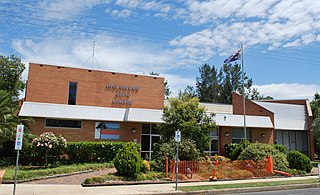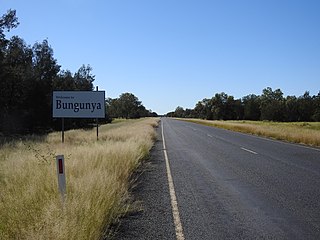
Inglewood is a rural town and locality in the Goondiwindi Region, Queensland, Australia. In the 2016 census, the locality of Inglewood had a population of 954 people, making Inglewood the second largest town in the Goondiwindi Region.

Yelarbon is a rural town and locality in the Goondiwindi Region, Queensland, Australia. It is on the border of Queensland and New South Wales. In the 2016 census, Yelarbon had a population of 364 people.
Yandilla is a rural locality in the Toowoomba Region, Queensland, Australia. In the 2016 census Yandilla had a population of 46 people.

Groomsville is a rural locality in the Toowoomba Region on the Darling Downs, Queensland, Australia. In the 2021 census, Groomsville had a population of 132 people.
Captains Mountain is a locality in the Toowoomba Region, Queensland, Australia. In the 2021 census, Captains Mountain had a population of 74 people.

Domville is a rural locality in the Toowoomba Region, Queensland, Australia. In the 2021 census, Domville had "no people or a very low population".

Spring Creek is a rural locality split between the Toowoomba Region and the Southern Downs Region, Queensland, Australia. In the 2016 census, Spring Creek had a population of 194 people.

Bungunya is a rural town and locality in the Goondiwindi Region, Queensland, Australia. The locality is on the border of Queensland and New South Wales. In the 2016 census, Bungunya had a population of 75 people.
Ellangowan is a rural locality in the Toowoomba Region, Queensland, Australia. In the 2021 census, Ellangowan had a population of 95 people.

Beebo is a rural locality in the Goondiwindi Region, Queensland, Australia. It is on the border between Queensland and New South Wales. In the 2016 census, Beebo had a population of 84 people.
Brush Creek is a rural locality in the Goondiwindi Region, Queensland, Australia. In the 2016 census, Brush Creek had a population of 40 people.

Coolmunda is a rural locality in the Goondiwindi Region, Queensland, Australia. In the 2016 census, Coolmunda had a population of 141 people.
Gore is a rural town and locality in the Goondiwindi Region, Queensland, Australia. In the 2016 census, the locality of Gore had a population of 36 people.
Greenup is a rural locality in the Goondiwindi Region, Queensland, Australia. In the 2016 census, Greenup had a population of 23 people.
Limevale is a rural locality in the Goondiwindi Region, Queensland, Australia. In the 2016 census, Limevale had a population of 64 people.

Oman Ama is a rural locality in the Goondiwindi Region, Queensland, Australia. In the 2016 census, Oman Ama had a population of 38 people.
South Talwood is a rural locality in the Goondiwindi Region, Queensland, Australia. It is on the border of Queensland and New South Wales. In the 2016 census, South Talwood had a population of 95 people.
Whetstone is a rural locality in the Goondiwindi Region, Queensland, Australia. In the 2016 census Whetstone had a population of 65 people.
Bringalily is a rural locality in the Toowoomba Region, Queensland, Australia. In the 2016 census Bringalily had a population of 83 people.
Millwood is a rural locality in the Toowoomba Region, Queensland, Australia. In the 2016 census Millwood had a population of 23 people.









